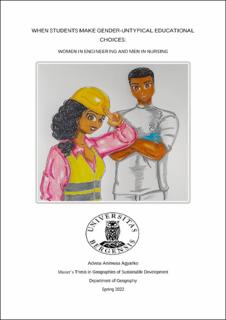WHEN STUDENTS MAKE GENDER-UNTYPICAL EDUCATIONAL CHOICES: Women in Engineering and Men in Nursing.
| dc.contributor.author | Agyarko, Adwoa Aninwaa | |
| dc.date.accessioned | 2022-06-04T00:11:08Z | |
| dc.date.available | 2022-06-04T00:11:08Z | |
| dc.date.issued | 2022-05-16 | |
| dc.date.submitted | 2022-06-02T22:00:13Z | |
| dc.identifier.uri | https://hdl.handle.net/11250/2997578 | |
| dc.description.abstract | Both males and females face forms of gender stereotypes in their everyday lives, right from the workplace to homes. Gender stereotypes have also found their way into educational institutions of which universities are no exception. This thesis, based on a two-month-long fieldwork in Ghana in 2021, centralizes on gender stereotypes. It divulges the experiences, challenges and study situations of male nursing students and female engineering students at the University of Ghana. Nursing and Engineering are two very gender stereotypical courses and career paths. Conceptualizations of gender such as Gender as a Social Construction, Gender Ideologies and Gender Roles will act as frameworks in explaining the various experiences of respondents as well as the reasons behind their current study situations. This thesis addresses the research question: How do gender stereotypes influence the study situation for students making gender-untypical educational choices at the University of Ghana? The main objectives of this research are: 1. To explore the reasons behind male nursing students and female engineering students choosing such gender-untypical programmes. 2. To divulge the experiences of male nursing students and female engineering students. 3. To identify the coping strategies of these students. The qualitative methodological approach was applied in this study. Data was collected via semi-structured interviews. A total of 31 respondents participated. The study identifies that gender ideologies, the social construction of appropriate behaviour for both men and women, play important roles in the educational choices and eventually career paths of students. Some students who make gender untypical educational choices, particularly the men studying nursing, raise brows and are often subjected to ridicule. The women studying engineering on the other hand, have their femininity questioned. The findings of this study reveal that gender stereotyping still exists even in the academic society. The gender-untypical students i.e., men in nursing and women in engineering, come up with strategies to cope with the negative gender stereotypes they face. These include ignoring stereotypical attitudes and defending themselves against such negative stereotypical behaviours. | |
| dc.language.iso | eng | |
| dc.publisher | The University of Bergen | |
| dc.rights | Copyright the Author. All rights reserved | |
| dc.subject | gender stereotypes | |
| dc.subject | nursing | |
| dc.subject | gender | |
| dc.subject | Gender | |
| dc.subject | Nursing | |
| dc.subject | female engineering students | |
| dc.subject | gender ideologies | |
| dc.subject | Gender Stereotypes | |
| dc.subject | engineering | |
| dc.subject | Engineering | |
| dc.subject | Gender Ideologies | |
| dc.subject | male nursing students | |
| dc.title | WHEN STUDENTS MAKE GENDER-UNTYPICAL EDUCATIONAL CHOICES: Women in Engineering and Men in Nursing. | |
| dc.type | Master thesis | |
| dc.date.updated | 2022-06-02T22:00:13Z | |
| dc.rights.holder | Copyright the Author. All rights reserved | |
| dc.description.degree | Master's Thesis in Geography | |
| dc.description.localcode | GEO350 | |
| dc.description.localcode | MPGEOGR | |
| dc.description.localcode | MASV-PHYG | |
| dc.description.localcode | MASV-MEHA | |
| dc.description.localcode | MASV-GEOG | |
| dc.subject.nus | 733111 | |
| fs.subjectcode | GEO350 | |
| fs.unitcode | 15-41-0 |
Files in this item
This item appears in the following Collection(s)
-
Master theses [143]
